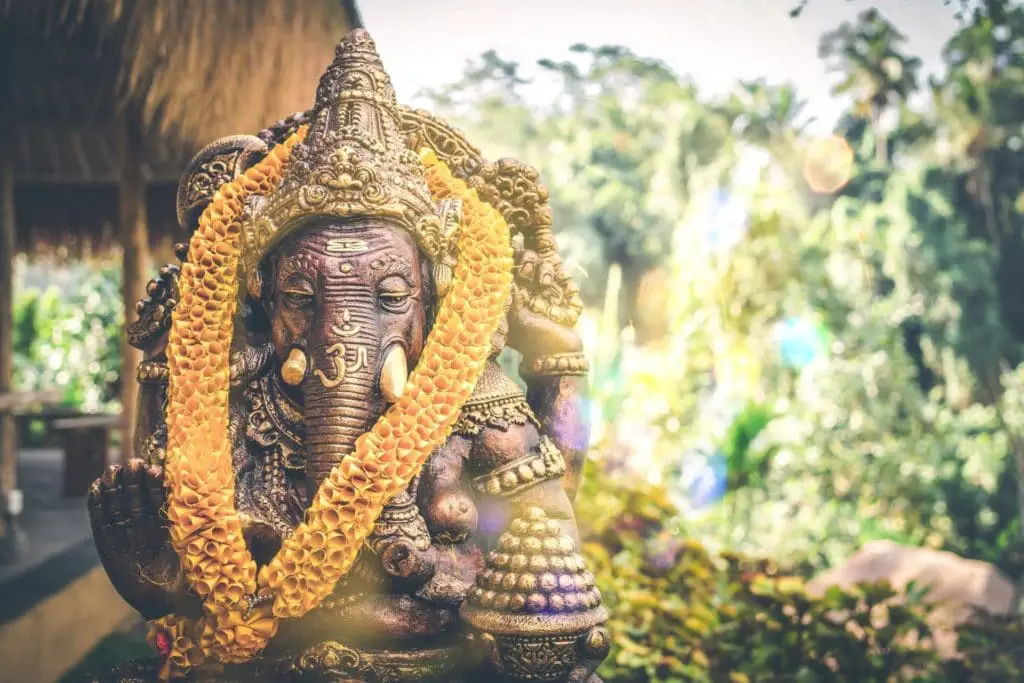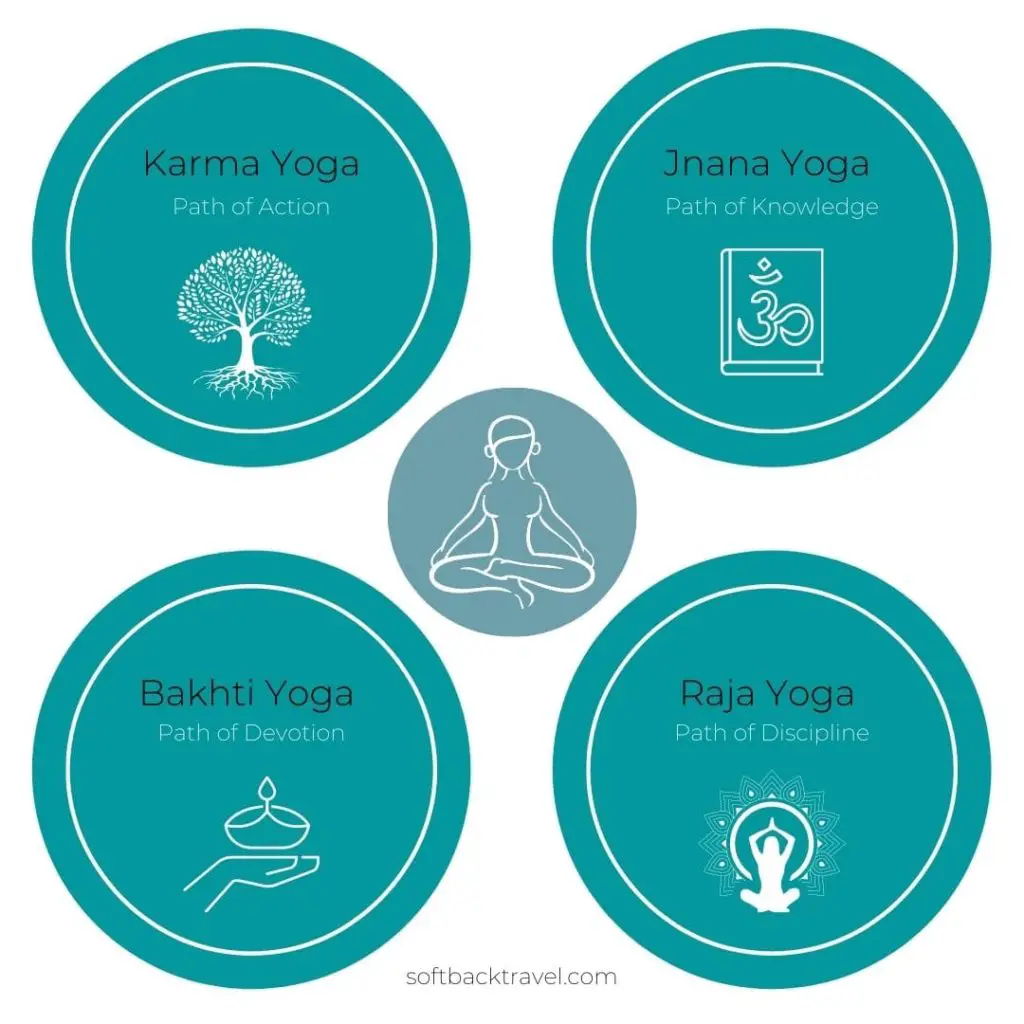Here’s the thing: The world would be a better place if we all practiced more Karma Yoga.
But what exactly is Karma Yoga and how can its principles benefit us?
Table of Contents
What is Karma Yoga?
To answer the question how Karma Yoga can change your life, let’s first take a quick look at the definition of yoga.
Yoga is the science of uniting the mind, body and soul. It’s about each individual being part of a universal consciousness.
There are four main paths of Yoga in spiritual practices of Hinduism:
Bhakti Yoga (Path of Devotion), Jnana Yoga (Path of Knowledge), Raja Yoga (Path of Discipline), and Karma Yoga (Path of Action).
Karma Yogis practice unselfish action as a form of prayer. They act according to dharma (regarded in Hinduism as a cosmic law underlying right behavior and social order), without expecting to gain anything from it.
While other forms of yoga focus on self-development and self-realization (typically with isolation and meditative introspection), Karma Yoga is about dedication to meaningful connections and selfless devotion with a pure motive.

When we truly unite with our karma, we eliminate egoism, hatred and jealousy from our hearts and replace it with love, joy and compassion.
What are the Principles of Karma Yoga?
The Law of Karma is one of the fundamental doctrines not only in Hinduism, but also in Buddhism and in Jainism.

According to the Bhagavad Gita, the primary holy scripture for Hindus,
“Karma Yoga is the selfless devotion of all inner as well as the outer activities as a Sacrifice to the Lord of all works, offered to the eternal as Master of all the soul’s energies and austerities.”
This can be based on several principles:
Principals of Karma Yoga

- Have the Right Attitude: What you do is not important – it’s about how you do it. Work is worship.
- Separate Motive from Action: Motives require attachment in some form and attachments stem from desires, which are rooted in our egos. Let go of your ego! Realizing and understanding the danger that ego-driven decisions pose is a helpful step on your way to overcoming it.
- Do your Duty (Swadharma): We all have duties in life. Some are given to us (duties as a citizen of society, a child, a sibling etc.), others we have chosen (duties as a partner, friend, employee etc.). Do your duty with enthusiasm and attention.
- Serve Yourself: The most important duty we have is the one towards ourselves. Only once we have taken care of our own well-being, we can help those around us.
- Do Your Best: Whatever you do, do your best. The Law of Karma states that everything you do today is reflected in the future. Loving the work you do prepares a firm foundation for tomorrow (agami karma).
- Forget About Results: Work for the work’s sake and forget about the results. Devote yourself to the action – the journey is the goal.
- Respect the Consequences: Step back, observe and accept consequences as they come. Respecting the consequences of a result and again doing karma with the same enthusiasm means respecting God’s offerings to Karma Yogis.
- Follow the Discipline of the Job: Every job requires different levels of time, energy, patience, concentration and experience. Learn us much as you can.
In a nutshell: The essence of Karma Yoga is that you should wish to live in the service of God and as an upholder of Dharma.
If you follow the principles of Karma Yoga, you take full responsibility for your life and actions and accept whatever consequences that may arise from them. This will give you the freedom to live your life according to your own will or vision.
What are Benefits of Karma Yoga?

Practicing Karma Yoga benefits us all and – like mentioned above – could make the world a better place.
“There is no loss of effort here, there is no harm. Even a little of this service delivers one from great fear.”
Gita: Chapter II-40.
Benefits of Karma Yoga

- New skills: By doing your best, you will quickly learn new skills and become better at what you do. There is no loss in devoting yourself to a task.
- Activeness: Being alive means being active. Activeness is the key to self-development. You alone can decide how those actions will affect your present and future.
- Achievement of Goals: Practicing Karma Yoga will help you achieve your goals – professionally and personally. Think about it: Loving the work you do and giving it your all will prove your ambition to your employer, colleagues or partners. Doing the same with your duties in your personal life will strengthen your relationships.
- Calmness: As your mind becomes more flexible, you will be more tolerant and calm, eliminate prejudices, broaden your outlook on life and spiritualize your activities.
- Joy: Removing selfishness and achieving purification of the heart leads to experiencing unity and joy. This positive thinking will help your personality to grow, which in turn allows you to practice Karma Yoga with enthusiasm and energy.
- Positive Energy: What goes around comes around..
How to Practice Karma Yoga
In case the principles of Karma Yoga still feel a bit abstract to you, don’t worry. There are a couple of easy things that you can do to include Karma Yoga in your life.
Self-Care

If you want to change the world, start at home.
We know now that the goal with all kinds of actions is to stay detached. This can be mastered through a daily yoga routine. Mindfully embracing certain poses (Asanas) allows us to feel the deeper aspects of yoga.
Jnana Yoga (Path of Knowledge) is helpful here, as the practice of each yoga pose will communicate different feelings, emotions, thoughts, etc., and Karma Yogis should be able to connect to these.
Yoga that is practiced on the mat with awareness and knowledge will benefit when practiced off the mat, and therefore encourages the practice of good Karma Yoga.
Meditation in Action

A lot of people think that proper meditation is done sitting down somewhere on the floor in the corner of a room. And afterwards, when you’re enlightened, you get up and go out and live your life.
However, Karma Yoga is about taking the things you do on a daily basis and doing them from a meditative perspective. For example: Don’t do the dishes and think about your plans for the rest of the day. Do and the dishes and immerse into just that. Quiet your mind and be in the moment. That’s meditation.
Appreciation

Take the mindfulness you get from your Asanas and meditation practice out into the world.
Be aware of the resources that you use in your daily life and where they come from. Respect nature and all living beings.
Read: How to Save Trees
Express gratitude to those around you.
Contribution

Doing charity work is the classic action associated with this path of yoga and Karma Yogis often volunteer for a good cause.
But you don’t have to spend giant amounts of money or time in order to be a good Karma Yogi. It’s all about turning your daily life activities into offerings.
Help an old lady cross the street without expecting to gain anything from it. Share your knowledge with someone who needs it. Be there for a friend that needs somebody to talk to and don’t let them say they owe you.
Positive Attitude

A positive attitude is contagious.
Don’t let other people’s bad mood bring you down – cheer them up instead! A smile can make someone else’s day.
Karma yogis believe that serving the society with pure intentions takes you a step closer to divinity.
What are the Laws of Karma?
Whether you are a believer in Hinduism, Buddhism, or no religion at all, understanding the laws of Karma and following its guidelines will help you become more mindful of your thoughts and actions, and create good Karma in your life.
There are 12 universal laws of Karma.

12 Laws of Karma
- The Great Law
Also known as the Law of Cause & Effect, the Great Law is what most people associate with Karma: As you sow, so shall you reap. If you want love and happiness, be loving and spread happiness. Put out into the world what you would like to get back. - The Law of Creation
The Law of Creation is all about – yep, you guessed it – creation. Life happens only with our participation. Make use of your talents and create, for yourself and others. - The Law of Humility
„Refusal to accept what is will still be what is“. In order to change something, you must first accept it. - The Law of Growth
The fourth law is all about personal development. Again, if you want to change the world, you need to start at home – growth begins within ourselves. - The Law of Responsibility
Don’t look outward to find the cause of your problems. You are the result of the choices you have made. - The Law of Connection
Everything in your life is connected, including your past, present and future. Or as Einstein said: “The ancestor to every action is a thought”. - The Law of Focus
“One cannot direct attention beyond a single task”. While you might think of yourself as a multitasker, this law encourages us to focus on one thing at a time. That way, we get better results. For example, if we only concentrate on growing spiritually, there is no room for anger and frustration. - The Law of Giving & Hospitality
Practice what you preach! If you believe in something, act accordingly. This law is about selfless actions reflecting your deeper beliefs. - The Law of Here & Now
Let go of the past and embrace the present. Looking back is not going to change anything. In fact, it prevents you from creating new dreams and experiences. - The Law of Change
This law states that history repeats itself until you stop the cycle, by changing your path. - The Law of Patience & Reward
Achieving great things takes time. We need to remind ourselves that rewards are claimed only through patience and persistence. So even if it doesn’t look like you’re making progress right now, don’t give up – hard work pays off. - The Law of Significance & Inspiration
Every contribution you make to the world will make a difference. Even if it seems meaningless to you at times, whatever you share can be of great meaning and inspiration to somebody else!
Are you ready to follow the principles of Karma Yoga? And if you’ve been practicing Karma Yoga for a while already, what experiences have you made?
Let us know in the comment section below!

